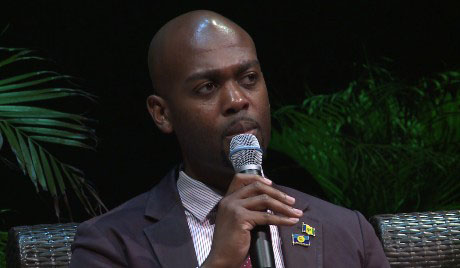BRIDGETOWN, Barbados, CMC – Cricket West Indies (CWI) vice president Dr Kishore Shallow has given the organisation’s administration a passing grade for its first year in office, pointing to improvements in just about all areas of the 10-point plan which the Ricky Skerritt-led team had used as a platform for election.
Among the biggest achievements, Dr Shallow said, have been an improvement in team selection which has boosted players’ confidence in getting a fair chance to represent West Indies, and a better relationship with CWI stakeholders.
Last March, the Skerritt-Shallow team defeated incumbent Dave Cameron and his running mate Emmanuel Nathan to take over the CWI leadership. They had presented a ‘Cricket First Plan’ to revitalise West Indies cricket, that promised: the creation of a cricket-centric organisational culture; optimum use of technology for greater effectiveness; increased investment in grassroots cricket; enhancement of the franchise system; modernisation of coaching education; increased exposure for Under-23 and Under-19 players; re-evaluation of system of team selection; repair of stakeholder relations; decentralisation of High Performance system; and utilisation of regional technical expertise.
Speaking on the Mason & Guest radio show here on Tuesday night, Dr Shallow said the administration had made some progress in those areas.
“We have touched on just about all of these points,” he said. “In West Indies cricket, over the years, we have had quite a few hurdles that we have to jump over and bearing all that in mind, I think we have done a fairly good job for the last 12 months.”
Among the areas he gave his team kudos for was revamping the selection process.
“This is one of the successes,” he said. “We have seen players have increased confidence in our system again and players believe that they are now selected more on merit and are putting up their hands, as Jermaine Blackwood, as Hayden Walsh, and other players have done.”
Dr Shallow also saw the CWI’s utilisation of regional experts as an accomplishment.
Seven months after the new administration took office, Phil Simmons, who had been sacked by the Cameron-led CWI, was brought back as West Indies head coach.
That, said Dr Shallow, plus the inclusion of other former cricketers Floyd Reifer, Kenny Benjamin, Gus Logie and Courtney Walsh in the coaching staff, and the involvement of Joel Garner, Brian Lara and Ramnaresh Sarwan in West Indies camps last year, demonstrated the CWI’s commitment to improving the game.
Addressing the modernisation of the coaching system, he pointed out that CWI had hired a specialist in development coaching, Australian Chris Brabazon, as its first-ever coach education manager. The former Western Australian Cricket Association coach development manager signed a three-year deal and began work last December.
“He has been making some progress so far,” Dr Shallow said.
The CWC vice president also pointed to improved relationships with players, regional governments and the media, saying, “all of our stakeholders are equally important to us.”
Speaking specifically about the promise to create a cricket-centric organisational culture, he said CWI has been able to fulfill its promise to move players “to the top of the priority ladder.”
He said while the four-year cricket calendar would be affected by the coronavirus (COVID-19) pandemic that has forced cancellations and postponements in the sport, CWI now “has a guide to work with.”
Dr Shallow also pointed to CWI’s increased use of technology: “We have been using Zoom and the Internet generally, to facilitate meetings and reduce our expenses, being more cost effective. We have a selection analyst being more analytical,” he reported.
As for increased investment in grassroots, he said that was a work in progress.
“We have started the dialogue with the governments across the region and what we are saying is ‘let us hold hands in improving cricket, in developing grassroots cricket’ and we expect them to invest as Cricket West Indies intend to do, but we have to do this together. And, quite frankly, they’ve been quite receptive to the idea. We have had a few discussions with Prime Ministers across the region and we intend to have a meeting with the other Prime Ministers at some point over the next two months,” he said.
Addressing the enhancement of the franchise system, the vice president said one of the achievements has been getting players at that level to realise that they are professionals and to understand what is expected of them as far as fitness was concerned.
“We have seen an improved fitness. They have been responding positively to the call of fitness,” Dr Shallow said.
The number two at CWI said the organisation was fully committed to doing what it was voted in to do.
“We continue to address all the items on our 10-point plan and we are using this as a guide to ensure that we keep performing,” he said.




